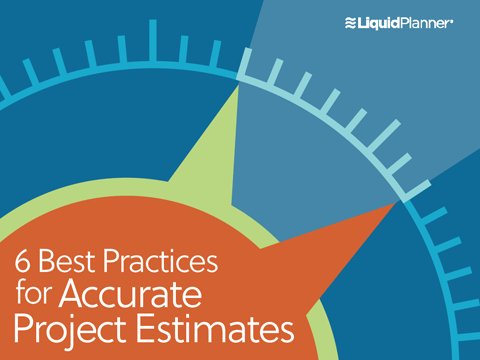Project management shouldn’t be a guessing game. Unless your last name is Nostradamus, your ability to predict the future will be based on logic and educated best guesses (and sometimes, just guesses). When it comes to building accurate project plans, being able to make ranged estimates based on best/worst case scenarios is one of the most reliable ways to set realistic goals, expectations and project confidence.
Estimating in ranges based on effort is one of the unique foundations of LiquidPlanner. This planning method pulls from a team’s individual and collective experience and accounts for the uncertainty and change that’s part of every project. Here are three important benefits of making ranged estimates on your project work.
1. Greater ease and confidence
Imagine that you’re estimating work on a project you’ve never done before. How confident would you be in your single-point estimate? Let’s say this is an important, high-visibility project, and you’re expected to be accurate – on one single estimate. Feeling stressed?
Now imagine, instead, that you give a low and high range estimate for the work. The reality and flexibility of this process suddenly become easier. Plus, by using a method that forces you to think through all the variables of a project lifecycle (the good, the bad, the ugly), you create a project schedule that tells the full story of what the team is looking at.
When you can give stakeholders a realistic schedule of when the project should come in, this not only creates goodwill, it builds trust and confidence, and makes your job a lot less stressful – and more profitable.
2. More reliable
What makes ranged estimates so reliable is that they factor in the uncertainty and changes inherent in every project – whether it’s work you’ve done a thousand times, or a project that’s heading your team into uncharted territory. If you’re using LiquidPlanner to manage your projects, you can make estimates on every task within a project, and each estimation will be calculated to roll up and give you a final estimate for the entire project.
3. An invaluable teaching and resource tool
A favorite aspect of ranged estimates by PM teams who use it is how the process teaches them to make more accurate estimates over time. It’s a simple formula: the more you do it, the better you get at it. Plus, you can use estimates on past projects to get an accurate review of what went well, and what you should be on top of the next time around.
Tip: When you make ranged estimates, try to be at least 80% confident that the actual outcome will fall in the range.
Benefits of making ranged estimates
- Makes a project duration realistic – which means everyone on the team is working toward an end-goal they can believe in.
- Improves team collaboration. If a team member provides an unusually low or high effort estimate, the entire team can provide feedback.
- Instigates open and honest dialogue about requirements and ways to work together constructively to work through the uncertainty factors.
- Encourages the team to ask questions, clarify any assumptions and refine more accurate estimates before either diving into a project, or continuing on part-way through after a few changes have popped up.
- Gives teams a reliable tool for managing and pre-empting risk.
To learn more about the art and science of making project estimates that instill trust and confidence, download our eBook, 6 Best Practices for Accurate Project Estimates.










